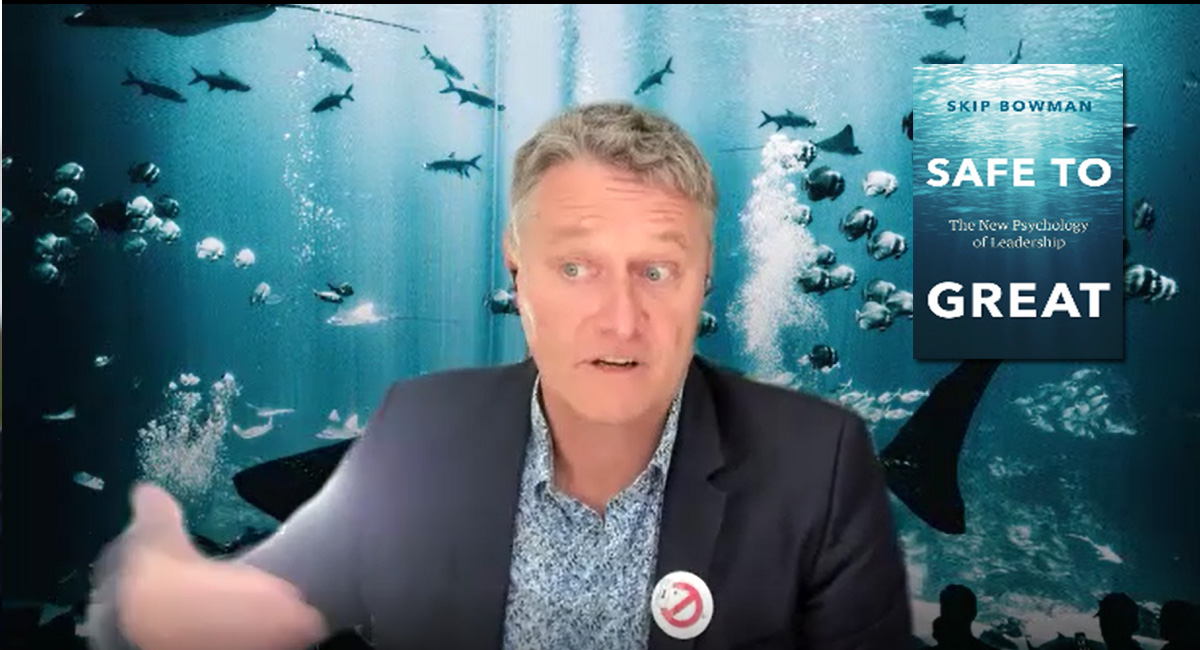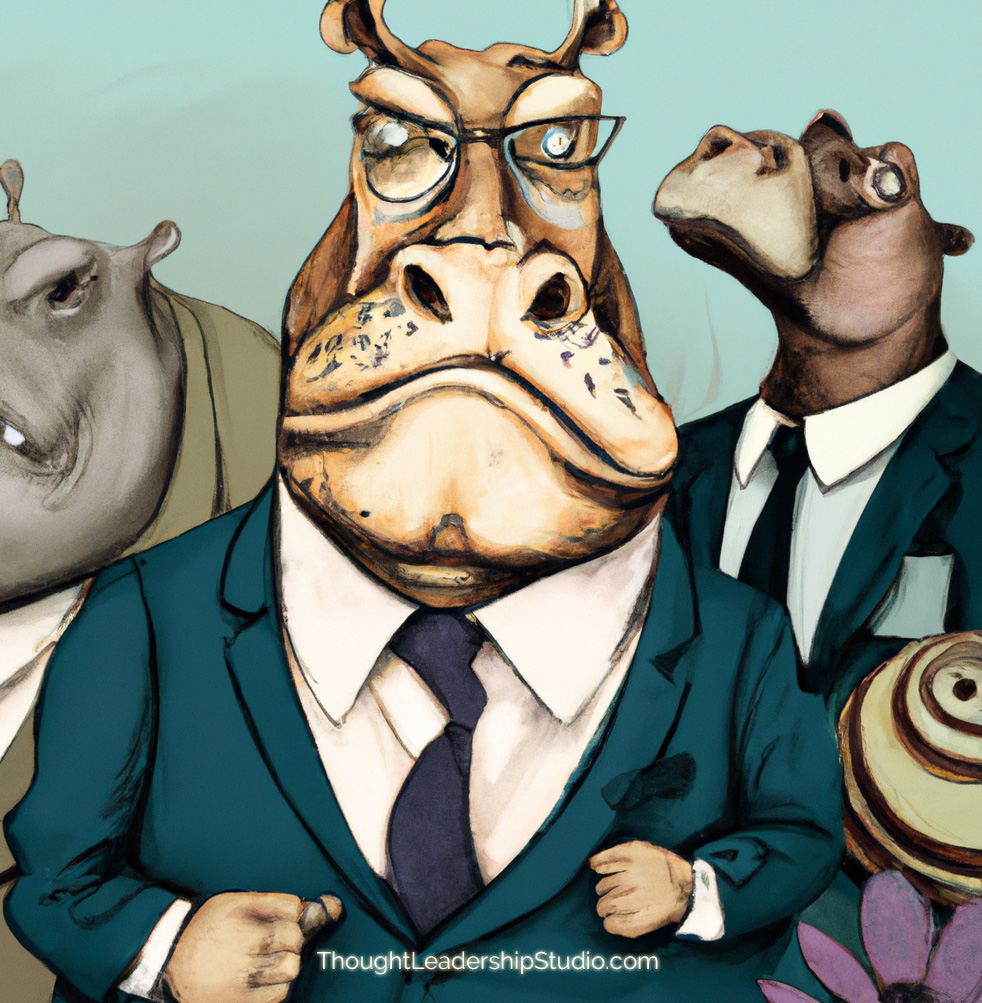Thought Leadership Studio Podcast Episodes:
From Safe to Great with Skip Bowman - Interview on TLS
Episode 41 - Author, consultant and keynote speaker focuses on how to transform with a growth mindset and psychological safety

#authors, #consulting, #insight, #inspiration, #interviews, #leadership, #paradigmchange, #storytelling, #systemsthinking, #thoughtleadershipexamples
Or Click here to listen or subscribe on appWhat this episode will do for you
- Learn how psychological safety is a prerequisite for a growth mindset, especially in the corporate world.
- Gain insight into how to create psychological safety to facilitate a growth mindset from author and consultant Skip Bowman.
- Learn what hippos, clams, and snails are in a leadership context.
- Discover how a doctor operated on the wrong side of the brain and how to avoid similar mishaps.
Skip Bowman.
Skip Bowman is an author, consultant, and keynote speaker focusing on how to transform organizations with a growth mindset and psychological safety.
Australian-born and Europe-based, he has worked with global organizations for over 25 years developing unique programs and approaches for his clients.
“People first” is Skip’s mantra for success in business, leadership, and organization change. Only when people feel valued and respected can you fully realize the potential of a purpose-based organization. The future of leadership is green and digital, and there is a need to re-imagine and re-engineer how we lead and organize in business.
After studying Finance in Australia, he went on to attain his M.A. in Psychology and Languages in Copenhagen. Skip has a Master in Organizational Psychology and completed additional training in cross-cultural management, group dynamics, coaching, and cultural change.
Skip’s approach to consulting and coaching is both inspirational and challenging.
He argues that we need principles for leading and organizing that are effective, morally right and save the planet.
Skip is also the author of the upcoming book, Safe to Great, to be published in September 2023. You can connect with Skip on LinkedIn and follow his insights on his blog.
Curated Transcript of Interview with Skip Bowman
The following partial transcript is lightly edited for clarity - the full interview is on audio. Click here to listen.
Chris McNeil: I'm your host, Chris McNeil with Thought Leadership Studio, and I'm sitting here across the globe with Skip Bowman, author of the upcoming book, Safe to Great, and who I'm learning is a visionary about how organizations can become more responsible to social environmental needs and this "new contract". Glad to have you here. Skip or there ...
 Skip Bowman: Thank you. I appreciate the opportunity. I'm excited to, to talk about these issues. They're really important.
Skip Bowman: Thank you. I appreciate the opportunity. I'm excited to, to talk about these issues. They're really important.
Chris McNeil: So, why don't we start with the 500 meters view of how you ended up where you are and writing the book, creating a vision, doing the work you do, and consulting, coaching and so forth.
Melding Psychological Safety with Growth Mindset
Skip Bowman: Yeah, I mean, I'm a practitioner of organization development, leadership development practitioner, psychologist, and have worked in the field for a long time. And I've always felt sort of like a burning desire to sort of take the concepts that I've developed over the years and sort of bring them together, integrate them better. And it is about eight years ago now that I sort of bumped into growth mindset and psychological safety a little bit at the same time.
And, you know, they speak to us for different kinds of reasons, but they've really stuck in the way that we look at leadership currently and into the future for some different reasons. But I think it's, uh, they, they were compelling and it made me sort of come up with that idea and sort of reinventing, you know, Jim Collins' famous book Good to Great.
Could we have a book called Safe to Great? Because I think fundamentally the workplace is less safe than it ever has been, primarily because the changes that are, are happening in the economy, in the labor market, in the contract that the relationship between organizations and employees is really changing. So I feel that safety and that, that wonderful book by Amy Edson really speaks to us at different kinds of levels. It's about team safety, but I think there's something bigger than that about, about feeling safe enough to take risks, safe enough to grow safe enough to learn.
And that's what I put into a concept that a lot of research around that. So I can measure it in leaders and organizations, put it into a book and, and wanna really try to shift the, the dial on what, what we might call a new psychology of leadership about what, how can we lead into the future of work? Not what has been the case for the last 50 years? Let's look into the future.
And AI and the green transformation are going to change everything. They're huge game changers. So I think it's relevant to, to ask that question, what does leadership should leadership look like for not just success, but for sustainable, meaningful, good change.
Chris McNeil: And a couple of touch points I'm getting from this are psychological safety and a growth mindset. And how do you see the relationship between those?
Skip Bowman: Well, I think they, they're lacking something with, if you don't have them together, you're missing something about how things at work function, right? If we just take psychological safety, it's a really cool idea, but it's not the goal itself that people feel safe. I mean that would not necessarily lead to innovation and growth and, you know, great customer service, whatever we're looking for, because it's like a foundation when we have it. We feel able to speak up to take risks, to share important ideas.
So when we put growth mindset on top, we kind of get that piece, we get that ambition, that desire, that, that wanting to transform ourselves and our teams. So when we combine them together, we get something I think meaningful. I think growth mindset without psychological safety is missing something in the sense that Dweck's book, Carol Dweck's book of our mindset is very famous because of Satya Nadella, but it lacks a sort of a theory about what happens at work because our performance is so fundamentally impacted by our leader and by our peers and colleagues.
And that's what psychological society is about. So if we bring that together, we start to understand that performance excellence, greatness is a relational sport. It's a team sport. So we need a theory like growth mindset, but we need that relational concept of psychological safety to make it really work. And that's what I put together.
Chris McNeil: Would it be fair to say and look at psychological safety as maybe an incubator setting and the growth mindset is the egg that we're trying to nurture within that environment?
 Skip Bowman: No, that's fair enough. I mean, yes, it's the only thing that is that I always get worried about psychological safety of something like fluffy and, and like an emu or an Austria sitting on an egg or something like that. (laugh), keeping it warm and protecting it.
Skip Bowman: No, that's fair enough. I mean, yes, it's the only thing that is that I always get worried about psychological safety of something like fluffy and, and like an emu or an Austria sitting on an egg or something like that. (laugh), keeping it warm and protecting it.
Or perhaps a penguin, cuz then it's a man doing it, which is always sort of a slightly, uh, interesting twist on things. But, I think you're right. I think the problem though is that we conceptualize, if you're talking about the people who really need to understand psychological safety, aren't the nice people in a workplace, they're the people who are actually quite tough, demanding, not very friendly, perhaps a bit antisocial bit bossy, right? ... they're the people who need to understand psychological safety.
But if I say to them, it's like nurturing an egg, they're gonna go, nah, I'm not into nurturing eggs. Right? I'm into breaking them.
Chris McNeil: And maybe that's a potential perception of values conflict - of mental toughness, and "I've got to be mentally tough and handle any challenge". But then there's this ... well, tell me what does psychological safety mean to you? And also for our listeners who may not be as familiar with the term or maybe just need a better definition of it.
Skip Bowman: What Amy Edson was, was interested in was if you take surgical units, you know, like a doctor operating on a patient, what we want for that to be successful is a relationship. A bit of teamwork between the people in the surgery who are willing to help each other do a great job, right? What she found out is that certain relationships between the doctor and the nurses or the anesthesiologists or whatever, influenced the success of the operation greatly, right? That's really what she found out.
 And she called that relationship psychological safety. So when there was psychological safety, surgical staff felt enabled, uh, had the mandate to challenge the surgeon when he or she was about to do something really bad. Classic example from the power of habit is an 80 year old patient with a hematoma on the left hand side of the, of the brain, the nurse keeps saying to the doctor, "Are you sure" who's about to operate on the right hand side of the brain?
And she called that relationship psychological safety. So when there was psychological safety, surgical staff felt enabled, uh, had the mandate to challenge the surgeon when he or she was about to do something really bad. Classic example from the power of habit is an 80 year old patient with a hematoma on the left hand side of the, of the brain, the nurse keeps saying to the doctor, "Are you sure" who's about to operate on the right hand side of the brain?
"Are you sure we're operating on the right, the right side of the brain here?" And, and he said, "No, no, it's fine." And she said, "Shouldn't we just check the documentation and the, and stuff?" "No, no, it's fine. I've got it under control."
And he opens up on the wrong side of the skull, and of course they don't find the hematoma they're looking for, they find nothing. So he has to close it up, opens up on the other side, and because of the nature of the complications of that, the 80 year old patient dies.
Chris McNeil: Not good.
Skip Bowman: So psychological safety is that we don't have that outcome (laugh). And, so it really matters. And that can matter lots of context that your listeners are concerned about. There's a lot of things that work safely, work well, work profitably when in a team we speak up about things that are going wrong, maybe not working, but also ideas, you know, sharing.
"Hey, I went to a customer today and they, they told me this, and I don't know whether it's true, but should we think about it? Should we talk about it?" So in people often think that psychological safety is the fear of making mistakes, and that's not the right interpretation. It's about the fear of talking about mistakes. Because as Amy Edmondson makes the point, we're making mistakes and we're missing opportunities every day. It's the fact that we, either we talk about it or we don't.
If we talk about the missed opportunities and the the mistakes, then we have psychological safety. If we don't, then we don't have it. We have what I would call the conspiracy of silence. Right?
Chris McNeil: So one thing I'm getting from this, and correct me if I'm wrong, is that a lack of psychological safety might be connected to strong command and control management, where the top makes all decisions and the workers, just all of that.
Hierarchies, Learning, and Psychological Safety
Skip Bowman: Yeah, I mean, that's what my research plays out. That in reality, hierarchy status differences are your biggest challenge here. Now there may be control. Um, it can be, if you take, Satya Nadella's work, he came up with the idea that we need to move from being know-it-alls to learn-it-alls, right. So he was concerned about knowledge as status. And by eliminating status in terms of knowledge or any other forms of status, any other forms of hierarchy, whether it be about knowledge or whether it be about power. These things matter.
So we're back to very old idea that flat teams, flat organizations tend to have higher levels of psychological safety. So your point is absolutely right. And my research plays that out. If you have leaders that are controlling coercive in, in approach, um, we get, you know, negative co quite strong negative correlations to psychological safety. But we also find a similar, uh, quality in what we call these know-it-all, what I call critical skeptical leaders, similar problem, but just even bigger. In other words, know-it-all. Leaders are in fact the worst type when it comes to how they negatively influence psychological safety in organizations.
Chris McNeil: That's really fascinating: know-it-all versus learn-it-all. It reminds me of some conversations I've had with guests and otherwise about applying systems thinking in a service business where you, when you start to become aware of how the command and control hierarchy actually gets in the way of providing the best possible service, which comes more from the people who actually are providing the service, those who have that, that transaction with the customer being able to be flexible and do what's right for the customer rather than conform to a standard that may not fit this particular case.
Enabling Autonomy
Skip Bowman: Yeah, that's certainly what research into customer service shows is high levels of autonomy - bounded autonomy as they would probably call it - you know, whether it be at Disney or whether it be Southwest Airlines, just to use some, maybe some familiar examples where we see that we see, um, great customer outcomes, right?
 I mean, they're bounded in the sense that tends to be processes and sort of systems that, you know, it's not a question of saying you can do anything you want, but there's a whole sort of like a, a structure around the autonomy that we're giving people. Autonomy is the biggest thing.
I mean, they're bounded in the sense that tends to be processes and sort of systems that, you know, it's not a question of saying you can do anything you want, but there's a whole sort of like a, a structure around the autonomy that we're giving people. Autonomy is the biggest thing.
Now it comes to growth mindset and psychological safety. Autonomy is the whole name of the game. And that's why my book, I talk about what's called the commitment premium is when we, when we move away from control, as our focus and move towards commitment, the big shift here is what we call enabling autonomy.
And that's really, that sort of links to all sorts of theories around self-determination, etcetera. But autonomy enhancing leadership leads to higher commitment and leads to psychological safety and growth. And that's what, that's what the book essentially sort of argues around. And it's not whether the book does - I mean, that's the research and all people first researchers pretty much say exactly the same. And that's what the social psychological research has shown.
But we have to understand that control is more common in organizations primarily because it's, if you like, the default way that we promote support, develop leaders. Like right now, when you see challenges with inflation and pressure on organization for expenses, boards are expecting CEOs to look tough, to make tough decisions, to look controlling. Why? Because when you're facing uncertainty, you replace logic or data with the look and feel of being in control.
Chris McNeil: Uh huh (affirmative).
Skip Bowman: So you see a lot of this, you know, game playing from a very senior leaders and not, you know, leaders throughout organizations. A response to uncertainty is to look tough and in control. So many of these decisions pass sacking 10,000 people, as we saw from some of these big IT companies had a lot more to do with looking like you've got it under control rather than actually having it under control.
Chris McNeil: Well, it makes sense how that could block essential learning.
Skip Bowman: Yeah, it's a pantomime of power, I call it, you know, it's, it's, it's basically a dance that we play, but it's, it's true psychologically. And if you look at Jeffrey Pfeffer's book around the Seven Rules of Power, you know, we know psychologically that humans respond to powerful moves ... leaders that show power, particularly when there's a higher degree of uncertainty. We tend to be drawn to narcissists when there's a level, a higher level of uncertainty.
Chris McNeil: Interesting. And I know that there's probably some listeners thinking, "Well, how does this apply to me?"
And if you're listening to this podcast, chances are you're the leader or aiming to be the leader of an audience, even if not a large organization. And I think a lot of these principles are very powerful for leading an online audience to a particular point of view where leaders could stand to be open and more learning and probably have more empathy and engagement from their audience, just like a CEO of a company would have as well.
So I think this applies to anyone in large scale influence.
What's the path to change? What have you learned from your work that would be helpful to all of us? And how, when you recognize this in yourself perhaps, or within an organization you're involved with ... I know we have consultants who are also listeners who may be doing change work within organizations and could perhaps diagnose the situation of too much command to control, perhaps creating too little psychological safety impeding growth.
How do you, how do you bring about change within an organization and within yourself when you that, and how would you recognize it?
Skip Bowman: You're going to have to map it. I don't think anyone's serious working in this field would, would, would suggest that people can sort of come upon this idea easily without some form of external feedback and support. It's a bit tricky today because there's an awful lot of HR practices that is, you know, basic Kool-aid, you know, that was, "let's just keep everyone happy and things will be fine".
 But you're really not going to get anywhere unless you sort of take a critical look at how we're currently behaving and, and be willing to embrace that things aren't as pretty as we'd like them to be. And since most organizations are pretty focused on making everything look pretty, it's not easy to reach that. But there are tools. I have some, and there are other organizations that do that enable people to get that picture.
But you're really not going to get anywhere unless you sort of take a critical look at how we're currently behaving and, and be willing to embrace that things aren't as pretty as we'd like them to be. And since most organizations are pretty focused on making everything look pretty, it's not easy to reach that. But there are tools. I have some, and there are other organizations that do that enable people to get that picture.
=The most important thing is there is no one recipe. We know the pathway forward, but we first have to find out where you are. Now, there are leaders that are going to be very controlling, competitive. I call them hippos the most dangerous animal in Africa. Cause when they poop, they throw it around with their tongue.
That's why I'm wearing the badge. No hippos.(laugh). Then you're gonna have critical skeptical leaders that are clams, which have very sort of like, know-it-alls perhaps not very social, very smart, very arrogant, negative, pessimistic. They have a different path forward.
And then we have snails, which you are complying complacent leaders, and they have a different recipe. And, and the point being about that is that far too often leadership models are sort of like one way, right? And I don't think that helps people because in principle ... Let's just take servant based leadership:
It's a great idea, but doesn't apply to a lot of people because a lot of leaders are already are serving. So it speaks to a controlling competitive type of leader, a hippo, much like the sort of humility vulnerability school would suggest, right?
And it's true that people who are very ego driven need to develop, you know, more empathy, be more humble, be more, you know, less status driven, et cetera. But that's not the advice you need to give to at least 30-40% of leaders who aren't struggling with that. They are actually struggling with the opposite, which is struggling to be assertive, to hold people accountable, to speak about their vision and set direction firmly. USo there's so much hype and talk about things. I feel you've got to have an approach which enables us to say, okay, what kind of pathway do you need to, to tread to move in the direction of higher commitment?
In other words, autonomy, enhancing growth mindset, I would call it. And once we've determined that I have to sort of start, um, sort of what I would call tipping the myths or the sacred cows that you have about yourself, because all behavior is tied into, you know, mental models, beliefs, and assumptions. And we're gonna have to challenge stuff because that shapes your perception.
So controlling leaders feel that the fact that their teams aren't performing has got nothing to do with them, but has something to do with the competency or attitude of the employees. The reality isn't is that's not very true or very often true. Yeah. It's simply because employees learn to cope with or resist powerful leaders. So what you're seeing is not their competency or confidence sort of, you know, naturally speaking, what you're seeing is how it has been shaped by the fact that you've been bossing them around. The more you boss people around the less confident and competent they're going to look.
Chris McNeil: Well, people learn to use their ingenuity to survive in a toxic system.
Skip Bowman: Yep. Survive. Yeah. As Bob Sutton says in his books, which are amazingly influential on me, which is, you know, the "no asshole rule" is exactly that is surviving, you know, organizations where we have too much power concentrated in too many people. And this is not the healthy way forward, but unfortunately an uncertain times where there's a lot of change coming from the outside of the organization, you know, you're going to see leaders grabbing onto that powerful, controlling way of leading. And that actually makes things worse rather than improves things, but it looks good.
Chris McNeil: So, you're talking about challenging beliefs ...
***************************************
The transcript is lightly edited for clarity and is a partial transcript- the full interview is on audio. Click here to listen.
***************************************
Free Stuff and Offers Mentioned in Podcast
***************************************
***************************************